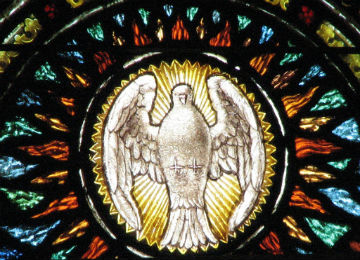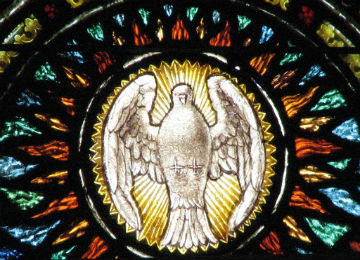
Acts 2 is a familiar chapter. In it we find the great Pentecost sermon by Peter, just after the Holy Spirit descended on those in Jerusalem in tongues of fire. The proximate cause of Peter’s well-known sermon is the accusation that those Christians baptized by the Holy Spirit were actually drunk, as if that were a reasonable explanation for their speaking in languages which they had not learned.
In any case, among the many fascinating aspects of Peter’s sermon is that fact that it does not focus directly on the ministry of the Holy Spirit, though that is what we might expect. Instead it focuses on the scriptures (Joel 2; Psalm16; Psalm 110) and on the person and work of Jesus Christ: “Men of Israel, hear these words: Jesus of Nazareth…”
But based on the teaching of Jesus, this is exactly what we should expect when the Holy Spirit is actively at work; it is exactly what Jesus said he would do. When the Holy Spirit is at work, the words of Christ, the witness to Christ, and the glory of Christ’s person and work are exalted. It is these three specific things which Jesus’ apostles are promised through the ministry of the Spirit, and I would contend that they still ought to guide our thinking today.
First, the words. Jesus promised that the Holy Spirit would be at work in the lives of the apostles reminding them of what he had taught them. In the Upper Room, on the night he was to be betrayed, Jesus told His disciples, “These things I have spoken to you while I am still with you. But the Helper, the Holy Spirit, whom the Father will send in my name, he will teach you all things and bring to your remembrance all that I have said to you” (John 14:25-26). In other words, the Holy Spirit’s work would draw attention to the teaching of Jesus. For the apostles, this meant that he would bring Jesus’ words to their minds in their preaching, and even guide some of them in the process of inspiration. This is why our New Testament, in its very words, carries with it the authority of Jesus himself.
Along with the words of Christ, the Holy Spirit also led the apostles to a truthful witness of Christ. Again, Jesus’ words in the Upper Room make this clear: “But when the Helper comes, whom I will send to you from the Father, the Spirit of Truth, who proceeds from the Father, he will bear witness about me. And you also will bear witness, because you have been with me from the beginning” (John 15:26-27). The Holy Spirit not only reminded the apostles of Jesus’ own teaching, but he also witnessed about Jesus so that the apostles, in turn, themselves be witnesses.
According to Jesus, the work of the Holy Spirit also involves glorifying Jesus. This encompasses the ministry of the word and the witness, of course, but it also involves showing the weight, the importance, the brilliance of these things. Jesus said, “When the Spirit of truth comes… He will glorify me” (John 16:13a, 14a). In other words, the importance and worth of Jesus – his beauty, grandeur, and magnificence – is something that the Holy Spirit serves continually to spotlight.
When we look at these three things, promised by Jesus and carried out by the Holy Spirit, we can see that much of the Holy Spirit’s ministry is a kind of spotlight ministry, focusing attention not on Himself, but on Jesus Christ. J.I. Packer has stated this especially well. He writes:
When floodlighting is well done, the floodlights are so placed that you do not see them; you are not in fact supposed to see where the light is coming from; what you are meant to see is just the building on which the floodlights are trained. The intended effect is to make it visible when otherwise it would not be seen for the darkness, and to maximize its dignity by throwing all its details into relief so that you see it properly. This perfectly illustrates the Spirit’s new covenant role. He is, so to speak, the hidden floodlight shining on the Savior.
Or think of it this way. It is as if the Spirit stands behind us, throwing light over our shoulder, on Jesus, who stands facing us. The Spirit’s message is never, “Look at me; listen to me; come to me; get to know me,” but always, “Look at him, and see his glory; listen to him, and hear his word; go to him, and have life; get to know him, and taste his gift of joy and peace.” The Spirit, we might say, is the matchmaker, the celestial marriage broker, whose role it is to bring us and Christ together and ensure that we stay together.[1]
No spotlight operator would consider it a complement for you to spend your time at the theater focusing on the light at the expense of the performance being illuminated; the operator would be gravely disappointed – and indeed would be considered a failure – if you left the raving about the drama of the spotlights and not about what you had seen on stage. So it is with the Holy Spirit: he focuses our attention, not primarily on himself, but rather on the Lord Jesus Christ.
Is this true in your own thinking? Is this what you think of when you think of “spirit-filled” preaching and teaching? Is this what you understand of the ministry of the Holy Spirit today?
The Spirit of God is at work, though not in some of the ways we are given to imagine. He is always at work to spotlight Jesus Christ – the word of Christ, the truthful witness about Christ, and Christ’s inestimable glory.
[1] J.I. Packer, Keeping in Step with the Spirit reprint ed. (Grand Rapids: Revell, 2002) p. 66 [emphasis in original].

The Alliance of Confessing Evangelicals is member supported and operates only by your faithful support. Thank you.















 © Alliance of Confessing Evangelicals
© Alliance of Confessing Evangelicals


